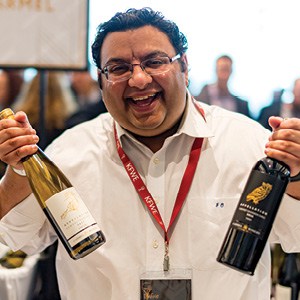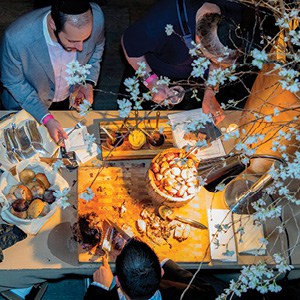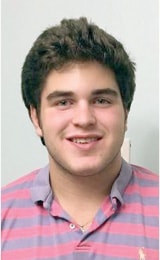Moments before writing this, I gave Scott Kaplan, president and CEO of Tidewater Jewish Foundation, an enthusiastic “Mazel Tov!” on hiring a new development associate and LIFE & LEGACY coordinator.
“So?” you may ask. The point is, we say “Mazel Tov!” for many reasons—such as achievements—in addition to myriad occasions.
For example, Lisa Barr, MD, a Norfolk native and local physician, certainly deserves a “Mazel Tov!” for the publication of her book, Outsmart Your Pain!
The teens who are part of Tidewater Jewish Foundation’s Emerging Philanthropists Council earn a community-wide “Mazel Tov!” for committing to learning about philanthropy.
The Israeli director who won an Oscar at last month’s event, rates a “Mazel Tov!” too. Page 24. Facebook has even gotten into the “Mazel Tov!” act. Check out the brief piece.
Of course, when we think of those two words, we generally conjure up images of B’nai Mitzvot and weddings and baby namings—of happy lifecycle events. And, so, we feature an article on how one bride prepared for her wedding and one on the latest kosher food and wine.
Not in this section, but rather in our usual Mazel Tov place in the paper , we wish a “Mazel Tov!” to Isabella Leon on her upcoming Bat Mitzvah at Congregation Beth El. And, Patti Wainger’s Humanitarian Award from the Virginia Center for Inclusive Communities is another cause to proclaim “Mazel Tov!”
Whatever your reason to celebrate, we hope you do so in a place of your choice, with friends and family and are smiling when you say or are the recipient of “Mazel Tov!”
Terri Denison
Editor
Weddings are lovely, but it’s the marriage that matters
CHICAGO (JTA)—My sister was married on a beautiful summer day many years ago.
Those of us in the wedding party took pictures in a garden before the ceremony. As maid of honor, one of my duties was to hold up the train of her dress so it wouldn’t drag through the dirt. But there was a lot of dirt, and the dress was soiled despite my best efforts. She couldn’t see the grime, but her bridesmaids could, so I silently made eyes conveying my distress over the maid-of-honor fail.
I can’t keep a secret from my sister. So, a minute later, nearly in tears, I blurted out, “Um, look at your dress,” pointing to the gray smudges on the bottom edge of the gown.
“Eh, oh well,” my super un-diva-like sister replied with a shrug. “We’re still getting married.”
She recognized that petty wedding details just didn’t matter.
All these years later, despite the garden mishap, they’re happily married with a brood of beautiful sons.
In American culture and the Jewish community, too, we get caught up in weddings. We pour ridiculous sums of money into them—the average price tag for a wedding rose to a record $35,329 in 2016, according to The Knot.
But more than that one big day, it’s all the days after the wedding that count—it’s really about the marriage.
Torah teaches us about the origins of (what we now call) marriage in another more famous garden—the Garden of Eden. For that’s where God saw that “it is not good for man to be alone” (Genesis 2:18) and created the first human couple, Adam and Eve. Marriage for them—and for all the married couples who follow(ed) in their footsteps down the aisle—was and is both meant to ensure the survival of humanity and help people find companionship and joy.
Now the Garden of Paradise may be gone, but our hopes for happy marriages endure.
One of the Jewish wedding blessings we still say under the huppah reflects that hope: “Make these beloved companions as happy as were the first human couple in the Garden of Eden.”
That’s a tall order, and ought to take a lot more energy than whether to have sushi or mini hot dogs during the cocktail hour.
When it was my turn to get hitched—it was on the same weekend as Tu b’Av, the ancient Jewish holiday of matchmaking. It’s the day, the Talmud tells us, when young women would go out dressed in white and dance in the vineyards—in the gardens, if you will—and try to catch the eye of eligible bachelors.
My fiancé and I had fun planning the wedding—so long as we remembered not to take it too seriously. Like when we spent hours singing along (loud and off-key) to Motown, big band, and pop classics to select for our wedding playlist. Oh, and there were many buttercream cakes to be tasted—now that’s my version of paradise.
But I’d never given thought to some of the other details in planning a wedding; I spent more time daydreaming about what comes next.
Take the wedding registry. I didn’t care whether we choose All-Clad or Calphalon pots and pans, nor could I tell you the difference between the two brands. What I did care about is sharing joyous meals around the kitchen table with my husband and, God willing, our children someday.
And then there’s the décor. I was asked to post some of my “dream wedding” pics on Pinterest, which for me meant signing up for Pinterest. Then I was supposed to envision “the wedding’s look”—the colors, the flowers, the napkin rings.
By Cindy Sher
Kosher gourmet fare and fine kosher wines from around the world draw record attendance at annual Kosher Food and Wine Experience

Josh Carmen
They came, they tasted, they plotzed. More than 2,000 curious foodies and oenophiles lined up to sample an astonishing showcase of gourmet kosher food and wine at the 13th annual Kosher Food & Wine Experience in New York City, hosted by Royal Wine Corp. The sold-out event took place on Monday, February 11 at Chelsea Piers in Manhattan.
The world’s largest kosher food and wine show proved again that the industry is working to meet consumers’ ever-growing interest in new epicurean horizons. At the same time, it demonstrated that the line between “kosher food and wine” and “outstanding food and wine that happens to be kosher” is growing blurrier every year.

The VIP room
KFWE 2019 coincided with the 70th anniversary of the Royal Wine Corp. From its roots as a local producer of kosher grape juice and sacramental wine, Royal Wine evolved under the stewardship of the venerable Herzog family to become the world’s leading producer, distributor, and importer of award-winning kosher wines and spirits.
More than 1,500 bottles were poured for the 2019 KFWE crowd, representing 300 exceptional wines from every major wine production region in the world. They included new kosher runs, French champagnes, and the new Israeli-produced line from NBA all-star Amare Stoudemire.
Some of the most well-received wines were the newly released vintages from France and Israel. According to Royal Wine’s Jay Buchsbaum, “Israeli wines are an unstoppable trend in the U.S. Retailers and restaurants recognize Israel as a region of world-class terroirs. They are fully on board, working with us to raise the profile of kosher wines that are on par with the greatest vintages from around the globe.”
Hundreds of intriguing samples from the area’s finest kosher restaurants, caterers, and specialty food companies were also served up throughout the evening. Eyebrow-raising options included cinnamon buns topped with fake “bacon,” deconstructed falafel, veal, duck, bison, varieties of wild mushroom, cooked and raw fishes, bourbon baked beans, risotto, and new twists on sushi.
Kosher.com, a Jewish lifestyle and entertainment website featuring thousands of kosher recipes and more than 18 original cooking shows, was among the dozens of vendors on hand. Editor Chanie Nayman says, “The kosher industry is more robust and more sophisticated than ever, and it’s showing no sign of slowing down. Not only are kosher eateries popping up all over the country, but everyone from home cooks to professional chefs are taking grandma’s kitchen legacy to an entirely new level.”
The Kosher Food & Wine Experience is produced each year by the Royal Wine Corporation. With annual shows in New York City, Los Angeles, and London, it is the largest exhibition of its kind. Visit http://TheKFWE.com for information on upcoming events.
Emerging Philanthropists Council prepares to distribute grants

Zach Sissel
Tidewater Jewish Foundation’s newly created Emerging Philanthropists Council (EPC) is off to a great start. With a generous donation of $25,000 as seed dollars, a Fund was created to help engage teens in the philanthropic process. Each year, the EPC will determine how to grant $1,000 to Jewish agencies.
For the first meeting, more than a dozen teens from all of Tidewater’s synagogues gathered to learn about philanthropy and tzedakah.
After studying both Maimonides Ladder of Tzedakah and Maslow’s Hierarchy of Human Needs, students discussed the challenges of prioritizing community needs and making funding decisions. Students also talked about some of the societal issues that are of particular concern to them.
At the next session, on March 14, students will hear from representatives of Jewish agencies about how they address some of those issues. Agencies are eligible to apply for a grant from the Emerging Philanthropists Council, and at the final meeting, which is planned for May, the students will determine where to grant the $1,000.
“It is beneficial and a privilege to be allowed to help the community in a way that me and my peers choose,” says Zach Sissel, a junior at Cox High School and a member of Temple Emanuel.
Students say they are excited to learn about the community and have an impact. For more information about the EPC, contact Scott Kaplan at 757-965-6109.
By Barb Gelb
Israeli director wins Oscar and cites his Holocaust survivor grandparents in acceptance speech
An Israeli director won the best live action short Oscar award Sunday, Feb. 24, and cited the Holocaust in his acceptance speech.
“I moved here five years ago from Israel—laila tov Yisrael [good evening Israel],” said Guy Nattiv, accepting the award for his short Skin, about former skinhead group member Bryon Widner and his transformation. “My grandparents are Holocaust survivors. The bigotry that they experienced in the Holocaust, we see that everywhere today, in America, in Europe. This film is about education, about teaching your kids a better way.”
Other Jewish nominees failed to take home Oscar trophies—including Rachel Weisz, up for supporting actress for her work in The Favourite, and the Coen brothers, whose script for The Ballad of Buster Scruggs was up for best adapted screenplay.
But BlacKkKlansman, co-written by Jewish writers Charlie Wachtel and David Rabinowitz (along with Kevin Willmott and director Spike Lee), won the best adapted screenplay award. The film centers on the first African-American cop in the Colorado Springs police force, who teams up with a Jewish detective to infiltrate the local Ku Klux Klan.
Barbra Streisand gave a passionate introduction for the video summarizing BlacKkKlansman, and noted that after she first praised the film on Twitter, she and Lee had an “easy” conversation about it, due to the fact that they both hail from Brooklyn.
Shallow from A Star Is Born won for Best Original Song for the writing and producing team that included Jewish songwriter, producer and DJ Marc Ronson. It was performed at the Oscars by Lady Gaga.
The evening opened with a performance of We Will Rock You/We Are The Champions by members of Queen with Jewish singer Adam Lambert. (JTA)
Saying ‘mazel tov’ on Facebook now activates a colorful confetti animation
(JTA)—The use of certain positive key words and phrases on Facebook activates quick animations. “Best wishes,” for instance, triggers a stream of colorful shapes. “You can do this” activates a trail of thumbs up emojis.
Now Facebook users who want to wish someone “mazel tov” get a colorful surprise too.
When a user types in the congratulatory Hebrew phrase, balloons and confetti pop up on screen.
Facebook has been adding to and tinkering with this “Text Delight Animations” feature for a while. The animation used to appear only when “mazel tov” was written out in Hebrew letters and not in English letters. The newest update, reported by Chabad.org, makes sure that English speakers who want to wish each other “mazel tov” don’t miss out on the fun.
By Josefin Dolsten

